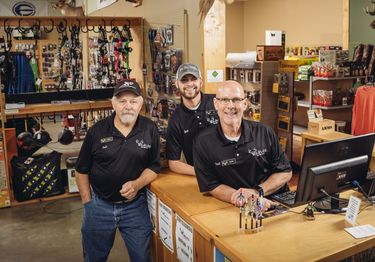
From the CEO of the Archery Trade Association...Some good tips for anyone in retail and customer service.
We could boil down our industry’s goals into one concept: putting more archery equipment into the hands of more customers.
The Archery Trade Association is working to accomplish that goal in many ways, but our endeavors share one common thread: sales.
We must sell partners on the value of our efforts. We must sell state agencies on the benefits of our programs. We must sell ATA members on the upside of our resources. In turn, you — our members — work like crazy every day to sell hunting gear, archery equipment, your expertise, and the experience of shooting a bow and arrows.
I’ve spent my life in sales. Whether working in my dad’s corner grocery, waiting tables or tending bar, selling my services to the next band I wanted to work for, or selling B2B services in my previous career – each job required sales skills.
Although a ton of leadership principles came from those experiences, I often had difficulty identifying the sales skills they taught me. During the past several years, I’ve focused on just two: customer service and selling from second place.
Sales from Service

In the archery industry, where some of the most important skills are technical, customer service can be challenging. Photo Credit: ATA.
I’m astonished by the simplicity of great customer service. It starts with responsiveness. Unfortunately, that step often gets skipped, but it’s easy to define in retail environments: No matter how busy we are, we must make everyone feel welcome when walking in our door. A simple greeting — “Thanks for stopping in! I’ll be with you in a few minutes!” — can generate sales instead of walk-outs.
And in our industry, where some of the most important skills are technical, customer service can be challenging. I also know from experience how easy it is to get sidetracked on coaching what we expect staff to do. That often comes at the expense of coaching our teams on how we expect them to do things.
Another misconception is that customer service is limited to interactions at the moment of a sale. Think about your latest marginal experience at a restaurant. For me, that was last week. I arrived early in the lunch hour at a new barbecue joint for a business meeting, so it was quiet. We ordered and everything arrived quickly. As expected, the food was great. I’ll certainly go back, but I’m skeptical. Here’s why:
Our server couldn’t leave us alone for more than three minutes. Further, even though the restaurant was empty and it was obvious we were discussing business, the host placed the next three parties near our table. It was intrusive and halted conversation at a couple of important times. I’ll recommend the place, but to fewer people than I might have otherwise.
My point? The whole experience is important. How our technicians interact with each other in the pro shop is as important as how they interact with customers on the floor. The Wharton business school teaches a great principle for these situations: The camera is always on. When we’re in a selling environment, no matter how busy, we’re always on stage.
If you already have great customer service, bravo! Don’t let up. But if you need to improve that service, start holding individual conversations with your team. Set expectations and then model the expected behavior.
Also, check out #custserv on Twitter. It might be a surprising resource, but it gives great glimpses into the customer and retailer sides of this equation.
Selling from Second Place

Maintaining focus is even more critical in business than in sports. Lose a race and you can likely win the next one. Lose a business lead and it might never recover.
A common sales adage absolutely applies to our industry: The most dangerous position in business is the top. If you think you’re the No. 1 business in your category, your brand has a giant target on its back. Everyone wants to beat you. That’s part of what I love about selling. Competition should never end.
So why is that dangerous? Overconfidence spawns complacency. It’s easy to fall into a comfort zone. “We’re on top. We’ve got such a huge lead that no one will catch us.” Tell that to the football player who drops the ball before crossing the goal line, the distance runner who coasts the last 20 meters, or the target archer who loses focus during the final end.
Maintaining focus is even more critical in business than in sports. Lose a race and you can likely win the next one. Lose a business lead and it might never recover. What’s more, multiple competitors can rightfully claim first place in all sorts of categories.
What do we do? Always sell as if we’re a distant second. You enjoyed a record October? Outstanding! Now work to have your best December. Shipped more product this quarter? Congratulations! Identify new sales that’ll protect your share the rest of the year. Archery has no offseason. Another bowhunting or bowfishing season is always on the horizon. The same is true for sales.
posted from;https://www.archerytrade.org/news/ceo-blog-two-skills-i-learned-from-a-career-in-sales

